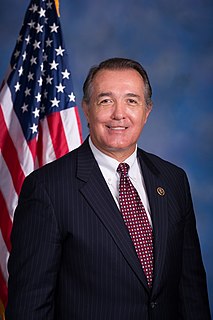A Quote by John Marshall
The constitution controls any legislative act repugnant to it.
Quote Topics
Related Quotes
The interpretation of the laws is the proper and peculiar province of the courts. A constitution is, in fact, and must be regarded by the judges, as fundamental law. It therefore belongs to them to ascertain its meaning, as well as the meaning of any particular act proceeding from the legislative body. If there should happen to be an irreconcilable variance between the two, that which has the superior obligation and validity ought, of course, to be preferred; or, in other words, the Constitution ought to be preferred to the statute, the intention of the people to the intention of their agents.
The equal protection standard of the constitution has one clear and central meaning - it absolutely prohibits invidious [repugnant] discrimination by government...Under our Constitution, any official action that treats a person differently on account of his race or ethnic origin is inherently [by nature] suspect and presumptively [probably] invalid...Under the Constitution we have, one practice in which government may never engage in the practice of racism - not even "temporarily" and not even as an "experiment."
[E]very act of a delegated authority, contrary to the tenor of the commission under which it is exercised, is void. No legislative act, therefore, contrary to the Constitution, can be valid. To deny this, would be to affirm, that the deputy is greater than his principal; that the servant is above his master; that the representatives of the people are superior to the people themselves; that men acting by virtue of powers, may do not only what their powers do not authorize, but what they forbid.
Americans were outraged and horrified by this president's reckless spending and his endless assaults on the Constitution, but no issue drove them to rise up and fight back like Obamacare - both the abominable legislative monstrosity itself and the tyrannical, corrupt manner by which Obama crammed it through the legislative process.
The principle of the Constitution is that of a separation of legislative, Executive and Judiciary functions, except in cases specified. If this principle be not expressed in direct terms, it is clearly the spirit of the Constitution, and it ought to be so commented and acted on by every friend of free government.





























